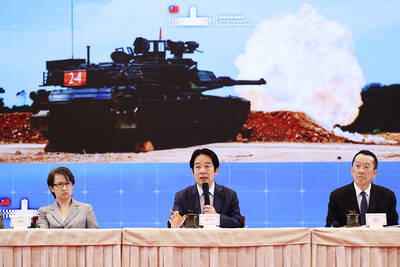It would make the perfect headline: Lady Gaga in an S&M tussle with Andy Warhol. The story would go on to describe, in intimate detail, the dripping of candle wax on Warhol’s naked torso, a whip to keep him in line and plenty of rope to ensure no escape.
Though implausible (Warhol’s been dead for 23 years), the above scene kicks off American Dream Factory (美國夢工廠), the latest play of social criticism by Against Again Troupe (再拒劇團), which begins tonight at Guling Street Avant-Garde Theatre (牯嶺街小劇場).
“It’s the play’s only S&M scene,” said Sammie Liu (劉柏珊), the production’s producer, an hour into a technical rehearsal on Wednesday night.
Pity, that, because Against Again Troupe does such a bang-up job of it — a cross between the gothic atmosphere of Warhol’s Flesh for Frankenstein and the false sexuality of a Gaga video (didn’t she used to be a blow-up doll?).
Directed by Huang Si-nung (黃思農), who co-wrote and workshopped the script with his four actors, American Dream Factory is a mise-en-scene that examines the export of the American dream. Here, however, democratic principles don’t lead to prosperity — the ad nauseum mantra mouthed by a string of recent US presidents.
Today’s American dream export, American Dream Factory suggests, is unfettered capitalism, consumerism and materialism, a dehumanizing product that perpetuates vast inequalities and turns people into automatons. Along with Gaga and Warhol — the latter played by Jack Yao (姚淳耀) of Au Revoir Taipei (一頁台北) fame — the play uses Ronald McDonald, Michael Jackson and Madonna as symbols of the American dream gone wrong.
American Dream Factory began as an art installation for the 2008 Singapore Fringe Festival. The installation comprises the set for the play and requires considerable visual multi-tasking to keep up with. Three televisions showing, for example, footage of Kurt Cobain smashing his guitar and Warhol eating a hamburger, add to the overall theme but also serve as a distraction to the human action. But that’s probably the point.
Though not a particularly original concept (it seems that every month sees a new play in Taiwan attempting to tackle consumerism and materialism as a subject), the fantastical staging of the production makes it an enjoyable ride.

For many centuries from the medieval to the early modern era, the island port of Hirado on the northwestern tip of Kyushu in Japan was the epicenter of piracy in East Asia. From bases in Hirado the notorious wokou (倭寇) terrorized Korea and China. They raided coastal towns, carrying off people into slavery and looting everything from grain to porcelain to bells in Buddhist temples. Kyushu itself operated a thriving trade with China in sulfur, a necessary ingredient of the gunpowder that powered militaries from Europe to Japan. Over time Hirado developed into a full service stop for pirates. Booty could

Jacques Poissant’s suffering stopped the day he asked his daughter if it would be “cowardly to ask to be helped to die.” The retired Canadian insurance adviser was 93, and “was wasting away” after a long battle with prostate cancer. “He no longer had any zest for life,” Josee Poissant said. Last year her mother made the same choice at 96 when she realized she would not be getting out of hospital. She died surrounded by her children and their partners listening to the music she loved. “She was at peace. She sang until she went to sleep.” Josee Poissant remembers it as a beautiful

Politically charged thriller One Battle After Another won six prizes, including best picture, at the British Academy Film Awards on Sunday, building momentum ahead of Hollywood’s Academy Awards next month. Blues-steeped vampire epic Sinners and gothic horror story Frankenstein won three awards each, while Shakespearean family tragedy Hamnet won two including best British film. One Battle After Another, Paul Thomas Anderson’s explosive film about a group of revolutionaries in chaotic conflict with the state, won awards for directing, adapted screenplay, cinematography and editing, as well as for Sean Penn’s supporting performance as an obsessed military officer. “This is very overwhelming and wonderful,” Anderson

Another moment of the US making permanent concessions for transient gains, which appears to be longstanding US policy with the People’s Republic of China (PRC), occurred last week when President Donald Trump announced that weapons sales to Taiwan would be delayed in order to arrange a meeting with the PRC dictator Xi Jinping (習近平). There were “concerns among some in the Trump administration that greenlighting the weapons deal would derail Trump’s coming visit to Beijing, according to US officials,” the Wall Street Journal reported. It attributed the suspension of the weapons sale to pressure from Xi. While some might shrug